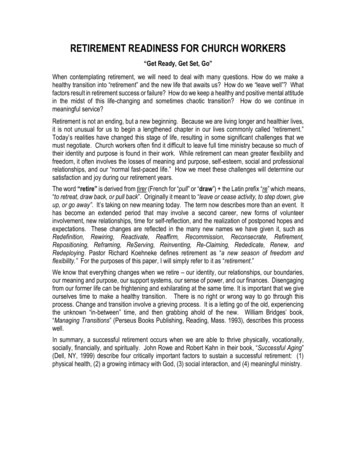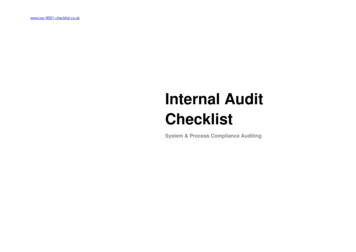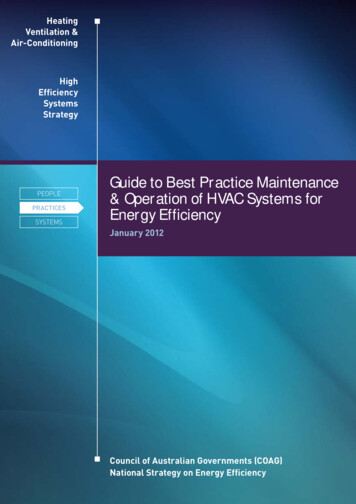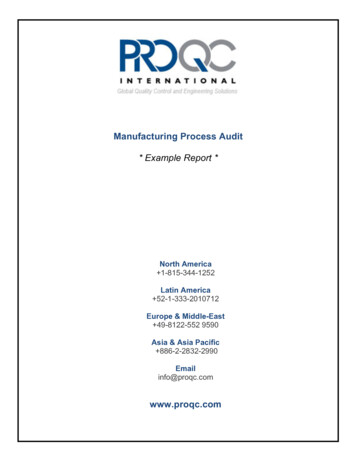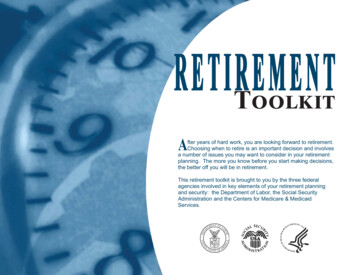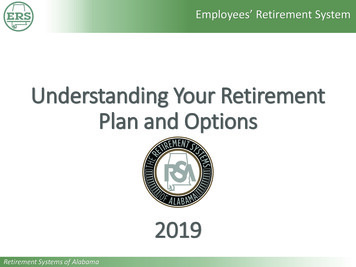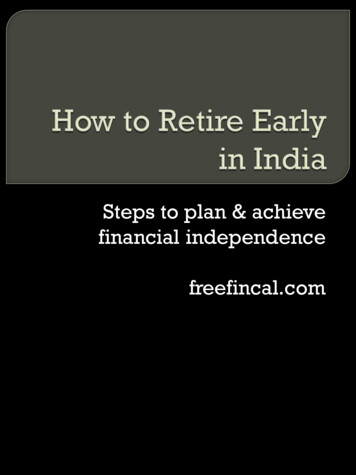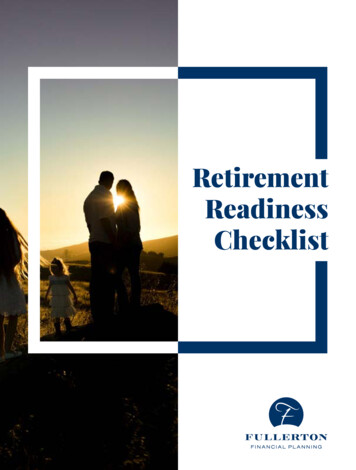
Transcription
RetirementReadinessChecklist
Picture this:You’ve worked hard all of your life, raised a family, doneall the right things, and saved and invested wisely.Now, it’s time to relax and enjoy the sweet years. But ifyou aren’t prepared for retirement, it can be anythingbut wonderful. What if you run out of money?Are you going to have to work until you’re 80?How much do you actually need to retire?And what if you overlooked details that can derailthe whole thing?Finding these answers can seem complicated andoverwhelming—even downright scary. But it doesn’thave to be. At Fullerton Financial Planning, our passion ishelping people develop plans for retirement, so they canlive a life with confidence.To get you started down the right path to an incredibleretirement, we developed a Retirement ReadinessChecklist that will help you get prepared.Check it out below.2
Develop YourRetirement DreamYour first step is to map out your retirement dream. Whatdo you want to do when you stop working? Travel thecountry in an RV? Buy a house on a lake and catch theone that always got away? Set up an art studio, so youcan while the hours away painting? How about spendingall your time with those grandbabies? Or for you golflovers, on the links?Next, pinpoint where you want to live. Will you stay in thesame location or possibly move closer to your family?This decision will play into how much money you’llneed. It’s a lot less expensive to call Wichita home thanSouthern California, for example.Making the plans will not only help you determine thenecessary savings, but it will also keep you inspired tokeep on saving and investing for your later years.3
Estimate YourLife ExpectancyTo start you on your way to an amazing retirement,you have to answer a question that most of us don’twant to think about—but it plays a big role in yourfinancial wellness: How long will you live? Why is that soimportant, especially since no one likes to figure it out?If you financially plan for an additional 20 years of lifeafter retirement and you make it to 95, you may outliveyour money.How, then, should you estimate how much you’ll need?Go with the stats. According to Social Security, theaverage life expectancy of a man is 83. For a woman,it’s 85.5. Genetics plays a role, too. If your parentsor grandparents lived into their 90s, there is a goodchance you will, too. We recommend for you to plan for25 years after retirement—or age 90.4
Take an Inventoryof Your AssetsNow that you have your retirement vision, it’s time towork out how to hit that goal. This starts by learningwhere you stand financially now. List your assets, likeproperties, vehicles, savings, etc. And then write downyour debts. Ideally, you want to enter retirement withno debt.This exercise will help you figure out your currentfinancial situation, plan for the future, and decide whatyou need to get there.5
Determine Your SocialSecurity BenefitsFor most of us, we’ve been paying Social Security all of ourworking lives, and it’s an important part of retirement. Buthere’s the catch. When you claim it plays a big role in howmuch you’ll receive. By law, you can claim Social Securitybenefits anywhere from age 62-70. But the longer you wait,the more you’ll receive.At full retirement, age 66-67 depending on where yourbirthday falls, you’ll get full credit. Each year you hold offafter full retirement age, you’ll receive an additional 8%annually until you hit 70. At that point, you’ll max out onwhat you can receive.You can also continue working once you begin collectingSocial Security, but your earnings will be limited. After acertain amount is earned, the Social Security Administrationbegins deducting from your benefits. In 2020, for example,the limit was set at 18,240. Once you reach that point,your benefits will be reduced 1 for every 2 you makeabove the limit.To estimate how much you’ll receive in Social Security, usethe administration’s online benefits calculator. It can helpyou compare benefits based on your age and earningsrecord. You can also estimate your spouse’s benefits. Youcan find the calculators here.6
Determine HealthCare OptionsOne of your biggest expenses after you retire will behealthcare. You are eligible for Medicare—the federalhealth insurance plan for seniors—at age 65. There areseveral plans available, so you’ll need to check themout. If you retire before 65, you’re on your own. Keep inmind that even with basic Medicare, you will incur healthcare expenses like deductibles, copays and prescriptioncosts. Most retirees add an additional supplementprogram to help cover those costs. You can check outsome plans here.7
Create a BudgetOnce you know where you are financially, it’s time tofigure out how much you’ll need to retire by creating apost-retirement budget. It’s simply writing down what youestimate you’ll spend each month and the income streamsto cover those expenses. Keep in mind that there are somebills that may disappear by the time you retire, like yourmortgage if paid off for example. But other expenses mayincrease, like healthcare, travel and other leisure activities.Remember that prices will go up, so factor in some inflation.AARP—a non-profit organization for Americans over 50—tells its members that a good rule-of-thumb estimate ofhow much money you’ll need is 80% of your pre-retirementincome. The 20% reduction is based on the fact you’ll nolonger be paying Social Security taxes or putting money intoyour 401(k). You’ll also save on work expenses, like the costof your commute, new clothes, dry cleaning, lunch out, etc.What that means is if you’re making 80,000, you’ll needaround 64,000 to maintain your current lifestyle. If you andyour spouse earn 2,000 each from Social Security, thatmeans that you’ll need about 16,000 a year from savings orother income streams.New York Life offers a free budget calculator and suggestssome things to list for your post-retirement budget:Check it Out!8
Create a BudgetIncome Examples: Wages Dividends from stock Interest from savings,CDS, etc. Social Security benefits Pensions Other IncomeExpense Examples: Mortgage payment or rent Vacation home mortgage Automobile loan (s) Personal loan(s) Charge accounts Federal income taxes State income taxes Real estate taxes Other taxes Utilities Household repairs andmaintenance Food Clothing and laundry Automobile expenses(gas, repairs, etc.) Life insurance premiums Homeowners (renters)insurance Automobile insurance Medical, dental anddisability insurance Entertainment and dining Recreation and travel Club dues Hobbies Gifts Major home improvementsand furnishings Professional services Charitable contributions Other and miscellaneousexpensesOnce you have these hard numbers, you can begin yourplan. Remember that your budget won’t be static. Youmay need to adjust it over the years to make sure it’s stillon track.9
Create Your BudgetIncome:Amount:Total Income:Expenses:Amount:Total Expenses:10
Stash Some CashWhen it comes to life, there is one thing you can alwaysexpect—the unexpected. Emergencies will pop up,whether it’s your car breaking down, an unanticipatedmedical bill, your HVAC biting the dust or a host of otherfinancial hits to your budget. That’s why we recommendyou build an emergency fund for these out-of-the-bluebills—even if you have a healthy amount of cash saved.So how much should you put aside? For non-retirees,most experts recommend you have an emergency fundof at least three to six months of living expenses. If you’reretired, you may not need that much cash. The amountshould be whatever you are comfortable with.So, why would you need an emergency fund if you haveaccess to your IRA or 401K? That’s an option, but thatmoney will probably be tied up in investments. The riskhere is withdrawing these funds when the market isdown, which will result in a financial loss. So, stash somecash for the bills you didn’t plan on. You won’t believethe peace of mind it will give you.11
Start Saving NowNow that you have your budget, how much do you needto save so you can reach your retirement goal? Financialexpert Chris Hogan, best-selling author of EverydayMillionaires: How Ordinary People Built ExtraordinaryWealth―and How You Can Too, recommends you invest15% of your gross income in good growth stock mutualfunds through tax-advantaged retirement savings planslike your employer’s 401(k) and a Roth IRA. Hogan’sfavorite is a Roth IRA, he says, because your moneygrows tax-free and you won’t be penalized for taking itout when you retire.Hogan estimates that a couple with an income of 56,000 can save around 1.1 million for retirement ifthey invest 15% of their income for 25 years. That jumpsto 1.9 million if they stick with the plan for 30 years.Your ideal goal is to be able to live off of the growth ofyour retirement savings, Hogan says, instead of dippinginto your nest egg. This is where a financial advisor candefinitely help. They can assist you with a plan to meetyour retirement goals.12
Eliminate DebtOne of the biggest drains on your retirement is debt.Every dollar you owe reduces your after-work income.The ideal situation is to be debt-free by the time youretire, but that’s not always possible. We recommendpaying off high-interest rate debt and then do a balanceof savings and paying off your low-interest loans. Afterall, it’s awesome to be debt free, but that won’t help youif you have zero savings in the bank. You can check withone of our financial planners to learn the best way tohandle your debt.13
Estate PlanningEstate planning can be one of the most complicatedparts of your retirement plan, so it’s a good idea to makesure everything is in order.What exactly is estate planning? It’s deciding on howyour assets will be distributed after your death or if youare unable to make financial decisions. Your net worthshouldn’t be a factor with this one. Everyone needs aplan. Some of the benefits of an estate plan include: Your wishes on who will receive your assets will belegally binding. You’ll be avoiding an administrative nightmare foryour loved ones. Your affairs will be in order. You can get the best tax-savings for your estate.14
Organize Important Documentsin a Single, Secure PlaceIn the event of your death, you want to make it as easy aspossible for your loved ones. That is why we recommendthat you organize all your important documents in a single,secure place. We know in today’s world of everything digital,it might seem old-fashioned. But you don’t want your familyto have to try and figure out your passwords or try to findout where everything is stored online while they are alsodealing with your death.Financial guru Dave Ramsey calls his secure place a“Legacy Drawer.” Everyone should have one, he says, andit should contain all of the important information your familyneeds if something happens to you.In it, Ramsey recommends you store: Will and estate plans Monthly budget Financial account Tax returnsinformation Funeral instructions Insurance policies Important documents Letters to your family15 Passwords Safe-deposit instructions
Retirement planning can be complicated. But with thehelp of a financial advisor, you will be prepared. Andwhen the time comes to stop working, you can enjoy lifeinstead of worrying about money.Let Fullerton Financial Planning help you completeyour retirement readiness and realize your dreams.Schedule a FreeConsultation Today.Fullerton Financial Planning (FFP) is an independent financial services firm and uses a variety of different investment methods.Investing involves risk, including the potential loss of principal. Investment advisory services are offered through Kingdom FinancialGroup, LLC (KFG), an SEC Registered Investment Advisor. KFG maintains a co-advisory relationship with AE Wealth Management.Neither the firm nor its agents provide tax or legal advice.
One of your biggest expenses after you retire will be healthcare. You are eligible for Medicare—the federal health insurance plan for seniors—at age 65. There are several plans available, so you’ll need to check them out. If you retire before 65, you’re on your own. Keep in
